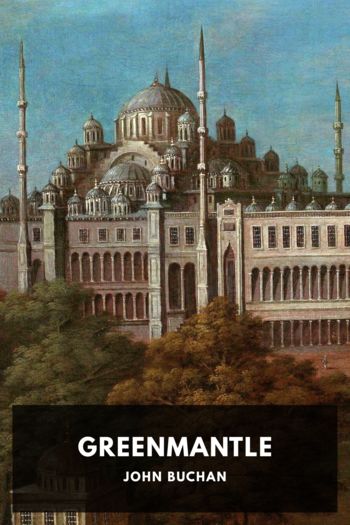Mr. Standfast - John Buchan (autobiographies to read TXT) 📗

- Author: John Buchan
Book online «Mr. Standfast - John Buchan (autobiographies to read TXT) 📗». Author John Buchan
I soon got to know a surprising lot of people, and they were the rummiest birds you can imagine. For example, there were the Weekeses, three girls who lived with their mother in a house so artistic that you broke your head whichever way you turned in it. The son of the family was a conscientious objector who had refused to do any sort of work whatever, and had got quodded for his pains. They were immensely proud of him and used to relate his sufferings in Dartmoor with a gusto which I thought rather heartless. Art was their great subject, and I am afraid they found me pretty heavy going. It was their fashion never to admire anything that was obviously beautiful, like a sunset or a pretty woman, but to find surprising loveliness in things which I thought hideous. Also they talked a language that was beyond me. This kind of conversation used to happen.—Miss Weekes: “Don’t you admire Ursula Jimson?” Self: “Rather!” Miss W.: “She is so John-esque in her lines.” Self: “Exactly!” Miss W.: “And Tancred, too—he is so full of nuances.” Self: “Rather!” Miss W.: “He suggests one of Degousse’s countrymen.” Self: “Exactly!”
They hadn’t much use for books, except some Russian ones, and I acquired merit in their eyes for having read Leprous Souls. If you talked to them about that divine countryside, you found they didn’t give a rap for it and had never been a mile beyond the village. But they admired greatly the sombre effect of a train going into Marylebone station on a rainy day.
But it was the men who interested me most. Aronson, the novelist, proved on acquaintance the worst kind of blighter. He considered himself a genius whom it was the duty of the country to support, and he sponged on his wretched relatives and anyone who would lend him money. He was always babbling about his sins, and pretty squalid they were. I should like to have flung him among a few good old-fashioned full-blooded sinners of my acquaintance; they would have scared him considerably. He told me that he sought “reality” and “life” and “truth,” but it was hard to see how he could know much about them, for he spent half the day in bed smoking cheap cigarettes, and the rest sunning himself in the admiration of half-witted girls. The creature was tuberculous in mind and body, and the only novel of his I read, pretty well turned my stomach. Mr. Aronson’s strong point was jokes about the war. If he heard of any acquaintance who had joined up or was even doing war work his merriment knew no bounds. My fingers used to itch to box the little wretch’s ears.
Letchford was a different pair of shoes. He was some kind of a man, to begin with, and had an excellent brain and the worst manners conceivable. He contradicted everything you said, and looked out for an argument as other people look for their dinner. He was a double-engined, high-speed pacificist, because he was the kind of cantankerous fellow who must always be in a minority. If Britain had stood out of the war he would have been a raving militarist, but since she was in it he had got to find reasons why she was wrong. And jolly good reasons they were, too. I couldn’t have met his arguments if I had wanted to, so I sat docilely at his feet. The world was all crooked for Letchford, and God had created him with two left hands. But the fellow had merits. He had a couple of jolly children whom he adored, and he would walk miles with me on a Sunday, and spout poetry about the beauty and greatness of England. He was forty-five; if he had been thirty and in my battalion I could have made a soldier out of him.
There were dozens more whose names I have forgotten, but they had one common characteristic. They were puffed up with spiritual pride, and I used to amuse myself with finding their originals in the Pilgrim’s Progress. When I tried to judge them by the standard of old Peter, they fell woefully short. They shut out the war from their lives, some out of funk, some out of pure levity of mind, and some because they were really convinced that the thing was all wrong. I think I grew rather popular in my role of the seeker after truth, the honest colonial who was against the war by instinct and was looking for instruction in the matter. They regarded me as a convert from an alien world of action which they secretly dreaded, though they affected to despise it. Anyhow they talked to me





Comments (0)